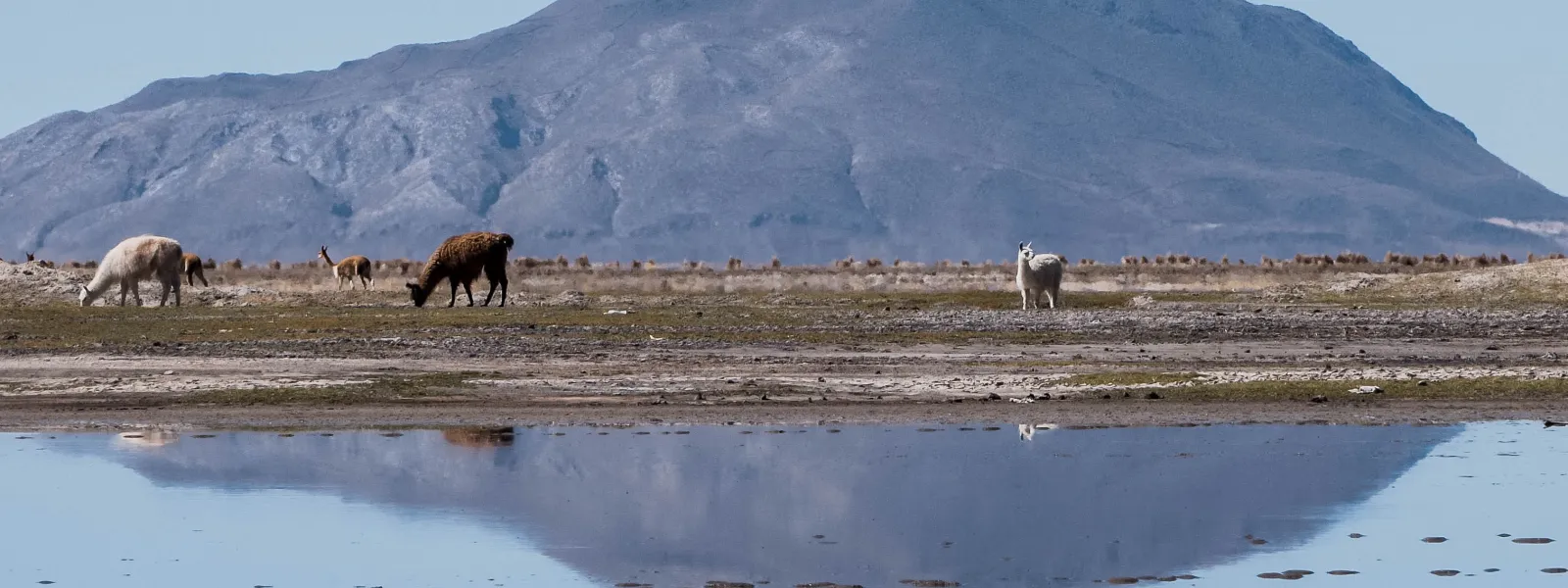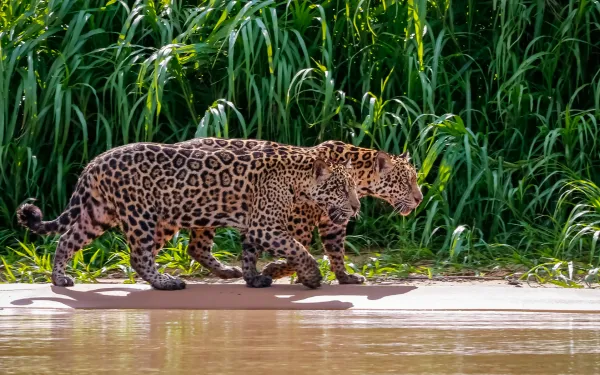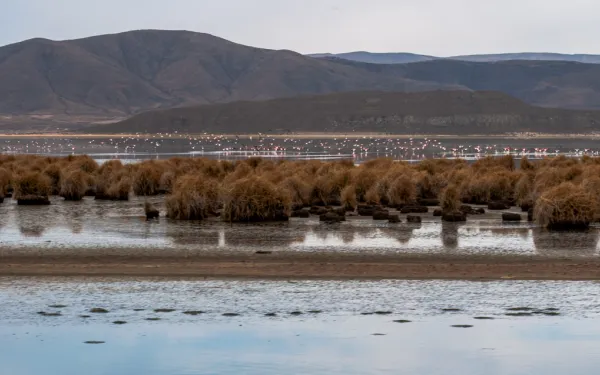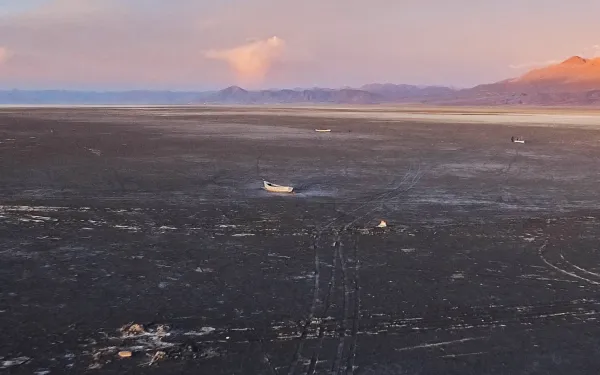
Project
Photo: T'uru Project/Película "Madre Agua: Tras el Rastro del Lago Poopó"Preserving Bolivia’s High-Andean lakes, sources of life
Located at 13,000 feet above sea level, in the high plateau of the Bolivian Andes, the Poopó and Uru Uru lakes are a source of life for indigenous and rural communities. Part of the water system of Lake Titicaca, they’re recognized as Wetlands of International Importance under the Ramsar Convention.
The Poopó and Uru Uru lake basin is also an important host of rich local biodiversity. During the winter season, the lakes are home to the largest concentration of flamingos in the high Andean region of South America. Approximately 200 species of animals and plants have been recorded there, including rare endemic and migratory birds.
But the health of these lakes is in critical condition. In just a few years, the water levels of Lake Poopó shrunk to alarming levels, before completely disappearing in 2015. Although Poopó is slowly recovering thanks to seasonal rains, it remains vulnerable in the dry season.
The serious environmental degradation of the lakes is the result of human activities that affect the quantity and quality of its waters, including the diversion of rivers, the climate crisis and mining activities.
Damages to these ecosystems put at risk the life systems that depend on them, including the subsistence of Aymara and Quechua communities, and the Uru Murato, one of Bolivia’s oldest native nations. The Uru Murato people were fishermen, but due to the contamination and reduction of the waters, they have been forced to migrate to work in the salt mines.
Partners:

Related projects
Latest News

In-danger designation requested for Pantanal wetlands in Brazil, Bolivia and Paraguay
On World Wetlands Day, advocates urged the Ramsar Convention Secretariat to conduct an advisory visit to wetlands severely affected by fires, and for the governments of the three countries to inscribe the sites on the global list of wetlands at risk of disappearing. Gland, Switzerland -- Civil society organizations sent an urgent alert to the Ramsar Convention today requesting a full assessment of damage caused by recent fires in the Pantanal, the world’s largest tropical wetland, a natural area shared between Brazil, Bolivia and Paraguay. The groups requested that the Secretariat conduct an advisory mission to analyze the state of six wetlands, which the Convention has recognized as being sites of international importance, and for the wetlands to be included on the Montreux Record, a list of the world’s most at-risk wetlands. The Interamerican Association for Environmental Defense (AIDA), the Center for Biological Diversity and Ecologia e Ação (ECOA) sent the alert on World Wetlands Day. They also urged the three governments to urgently implement measures to preserve the Pantanal as a transboundary ecosystem. The Ramsar sites addressed in the request are the Bolivian Pantanal; the Reserva Particular do Patrimonio Natural SESC Pantanal, the Reserva Particular do Patrimonio Natural Fazenda Rio Negro, the Pantanal Matogrosense National Park and the Taiamã Ecological Station in Brazil; as well as the Rio Negro National Park in Paraguay. "A Ramsar in-danger designation is crucial to combating the Pantanal’s huge and unprecedented fires, which now threaten Bolivia, Brazil and Paraguay," said Alejandro Olivera, a senior scientist with the Center for Biological Diversity. "Public policies that promote agriculture and livestock expansion and allow burning within the Pantanal have combined with limited cross-border collaboration to create a tinderbox. Ecosystem-damaging fires will continue without stronger commitments to protect these critical wetland habitats." In 2020, fires devastated 4.3 million hectares of the Pantanal region, the highest number since monitoring began in 1998; the number of fires burning in the area was 508% more than average. That same year, fires burned 100 percent of the Pantanal National Park Matogrossense. At least 10 million animals died in just three months. Unusually large fires continued in July 2021. "We are asking the States to comply with the obligations acquired before the Convention, generating coherent mechanisms and implementing policies and norms to protect the Pantanal," explained AIDA attorney Claudia Velarde. "An advisory mission to the six Ramsar sites could provide specialized assistance to the Brazilian, Bolivian and Paraguayan governments to overcome the conditions that pose risks to the conservation and wise use of this key wetland.” Likewise, the inscription of the sites on the Montreux Record can result in economic aid, support and technical advice, for the recovery of the Pantanal in the three countries. "We sent an urgent alert for Bolivia, Brazil and Paraguay to focus on the Pantanal as the world's largest transboundary freshwater wetland," said Andre Siqueira, President Director of ECOA. "The Ramsar Convention cannot achieve its objectives if the ecosystems it protects are significantly damaged by the continued use of fire, agribusiness and the lack of adequate resources to fight fires." The biodiversity and ecological richness of the Pantanal is incalculable. At least 3,500 species of plants, about 600 birds, 150 mammals, 175 reptiles, 40 amphibians and 300 freshwater fish inhabit the biome. Many are in danger of extinction in other regions, such as the tuyuyú and the jaguar, the marsh deer, the giant otter and the macaw, all emblematic species of the biome. The Pantanal is home to the highest concentration of species such as the jaguar and the caiman. press contacts: Alejandro Olivera (Mexico), Center for Biological Diversity, +52 612 1040604, [email protected] Victor Quintanilla (Mexico), AIDA, +521 5570522107, [email protected] André Luiz Siqueira (Brazil), ECOA, +55 67 33243230, [email protected]
Read more
Three advances for climate and environmental justice in 2021
In the face of increasing environmental degradation and the climate crisis, the strength of the collective struggle shows that it’s possible to ensure a healthy environment and a sustainable future for all people. This year, AIDA made important advances on that path, hand-in-hand with communities and allies in the region. The stories below tell of achievements that bring us closer to the environmental and climate justice we urgently need and for which we work every day. They are the stories that inspire us to continue working for the future. 1. Mayan women pave the way for responsible financing In Guatemala, under our guidance and with the support of local and international allies, the struggle of the Mayan women of Ixquisis to defend their water and territory has made history. Following a complaint against the large dams being implemented in their territory, the Inter-American Development Bank’s accountability office recognized the damage the dams caused and, for the first time, acknowledged the possibility of a responsible withdrawal of its investment. leARN MORE 2. Court ruling upholds the preservation of natural protected areas The intention of large real estate developers to dismantle the Yum Balam protected area for flora and fauna in the Mexican Caribbean has hit a wall. Mexico's Supreme Court set a key legal precedent by determining that the management program, fundamental to the sustainable use of the site, is legal. AIDA helped defend Yum Balam in court and, years earlier, our attorneys helped build the management program. LEARN MORE 3. International support reaches high-Andean lakes in Bolivia Together with local communities and organizations, AIDA requested international technical support for the recovery of lakes Poopó and Uru Uru in the Bolivian highlands, which was finally formalized by the government. This support, scheduled for next year, is vital for the recuperation of these ecosystems, life-support systems for biodiversity and the indigenous and peasant communities in the area. learn more Read these stories and much more about this year's journey in our 2021 Annual Report!
Read more
International technical assistance is consolidated to recover Uru Uru and Poopó lakes
At the request of organizations and communities, experts from the Ramsar Convention Secretariat will evaluate the degradation of the lakes and then issue technical recommendations for their recovery. Oruro, Bolivia. From October 11 to 15, a team of experts from the Ramsar Convention Secretariat will visit the Uru Uru and Poopó lakes, located in the central-eastern part of the Bolivian altiplano, to conduct a technical analysis of their degradation and then provide concrete recommendations to the Bolivian State for the recovery of the ecosystems. In July 2019—as part of the #LagoPoopóEsVida campaign—local communities and environmental, social and women's organizations sent the Ramsar Secretariat information on the state of the lakes and requested technical assistance to assess their health. The Bolivian government then made the formal request to make the visit feasible. "We recognize the political will of national authorities to obtain international support for the environmental crisis facing the lakes, on whose preservation the livelihoods of peasant and indigenous populations depend," said Claudia Velarde, an attorney with the Interamerican Association for Environmental Defense (AIDA). "Ramsar Advisory Missions are an effective tool offering independent and specialized advice geared toward the preservation of wetlands." Poopó is the second largest lake in Bolivia. In 2002, in order to preserve its biodiversity—which includes endemic and migratory birds and the largest number of flamingos in South America—Poopó and Uru Uru were declared a Wetland of International Importance under the Ramsar Convention, an intergovernmental treaty for the protection of these natural environments. "The Uru Uru and Poopó lakes guarantee the recharging of wells and other water sources, regulate the climate, provide habitat for birdlife, food security and sovereignty for surrounding populations, and shelter millenary cultures," said Limbert Sánchez, of the Center for Ecology and Andean Peoples (CEPA). Several factors have led to the catastrophic situation currently facing Lake Poopó, including: mining activities, which have not stopped during the pandemic and permanently generate acidic water and tons of mining waste; the diversion of tributaries like the Mauri River; the fact that the TDSP (Titicaca-Desaguadero-Poopó-Salar Water System) is not guaranteeing water for the entire basin; and the climate crisis. Cumulatively, these situations have damaged the lake and placed the life systems that depend on it at risk. "In December 2015, the water levels of Lake Poopó were completely reduced, one of the biggest environmental catastrophes in the country. Currently, what is left of the water mirror is minimal compared to historical records," corroborated Yasin Peredo, of the Center for Andean Communication and Development (CENDA). In addition to causing serious environmental damage, what’s happening to Lakes Poopó and Uru Uru is a serious violation of surrounding communities’ rights to water, health, territory, food and livelihood. "It’s with great sadness that we witness the disappearing of Lake Poopó, and the risk to our Lake Uru Uru," said Margarita Aquino, coordinator of the National Network of Women Defenders of Mother Earth (RENAMAT). "Mining contamination is stripping us of our water sources and is violating the rights of us women and our communities." Indigenous Aymara and Quechua communities depend on the health of these ecosystems, as do the Uru Murato, one of Bolivia's oldest native nations. The members of this millenary culture once lived from fishing, but the contamination of Poopó and its scarce water supply has forced them to migrate in search of other ways to survive. Don Pablo Flores, a native authority of the Uru de Puñaca community explains: "In August, authorities arrived and with them we went to the lake and found that there is no more water; the Panza Island sector is also dry. As Urus, how are we living? Before we used to go for parihuanas [Andean flamingos], but not now. In February they used to lay eggs and change their feathers. This year there are none. The flamingos are dead. The lake does not exist now. The three Uru communities are suffering; we used to live from hunting and fishing. We ask the municipal, departmental and national authorities for more attention because, so far, practically nothing has been done to save, protect and recover our lake Poopó." By including the Uru Uru and Poopó lakes as a Ramsar site, the Bolivian State committed itself to conserving the ecological characteristics of these wetlands. In this sense, the visit from the mission of experts is a key opportunity to obtain objective and specialized recommendations aimed at fulfilling this commitment. "Environmental organizations, communities and the people of Bolivia are awaiting the visit of the Ramsar Mission. We believe that the current situation of the ecosystem must be taken into account, but also the factors that continue to influence its degradation. As long as strategies to combat climate change are not adopted, mining pollution is not stopped, and the amount of water needed for the entire TDPS is not guaranteed, the critical situation of our Uru Uru and Poopó lakes cannot be reversed," said Ángela Cuenca, coordinator of the CASA Collective. PRESS CONTACTS: Victor Quintanilla (MExico), AIDA, [email protected], +5215570522107 Angela Cuenca (Bolivia), Colectivo CASA, [email protected], +59172485221 Limbert Sanchez (Bolivia), CEPA, [email protected], +59172476802 Sergio Vasquez Rojas (Bolivia), CENDA, [email protected], +59172734594
Read more